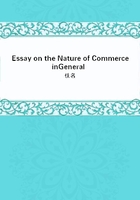
第34章
Of the Inequality of the circulation of hard money in a state The city always supplies various merchandises to the country, and the landowners who reside in the city should always receive there about a third of the produce of their land. The country thus owes to the city more than half the produce of the land. This debt would always exceed one half if all landowners lived in the city, but as several of the least important live in the country I suppose that the balance or debt which continually returns from the country to the city is equal to half the produce of the land and is paid in the city by half the products of the country transported to it and sold to pay this debt.
But all the countryside of a state or kingdom owes a constant balance to the capital, as well for the rents of the more considerable landowners who reside there as for the taxes of the state or crown, most of which are spent in the capital. All the provincial cities owe a constant balance to the capital, either for the state, upon houses or consumption, or for the different commodities which they draw from the capital. It happens also that several individuals and landowners who live in the provincial cities go to spend some time in the capital, for pleasure, or for the judgment of their lawsuits in final appeal, or because they send their children thither for a fashionable education. Consequently all these expenses incurred in the capital are drawn from the provincial cities.
It may therefore be said that all the countryside and all the cities of a state owe regularly and annually a balance or debt to the capital. But as it is all paid in money it is evident that the provinces always owe considerable sums to the capital; for the products and commodities which the provinces send to the capital are sold there for money, and with this money the debt or balance in question is paid.
Suppose now that the circulation of money in the provinces and in the capital is equal both in quantity of money and speed of circulation. The balance will be first sent to the capital in cash and this will diminish the quantity of money in the provinces and increase it in the capital, and consequently the raw material and commodities will be dearer in the capital than in the provinces, on account of the greater abundance of money in the capital. The difference of prices in the capital and in the provinces must pay for the costs and risks of transport, otherwise cash will be sent to the capital to pay the balance and this will go on till the prices in the capital and the provinces come to the level of these costs and risks. Then the merchants or undertakers of the market towns will buy at a low price the products of the villages and will have them carried to the capital to be sold there at a higher price: and this difference of price will necessarily pay for the upkeep of the horses and menservants and the profit of the undertaker, or else he would cease his enterprise.
It will follow from this that the price of raw produce of equal quality will always be higher in the country places which are nearest the capital than in those more distant in proportion to the costs and risks of transport; and that the countries adjacent to seas and rivers flowing into the capital will get a better price for their produce in proportion than those which are distant (other things being equal) because water transport is less expensive than land transport. On the other hand the products and small wares which cannot be consumed in the capital, because they are not suitable or cannot be sent thither on account of their bulk, or because they would be spoiled on the way, will be infinitely cheaper in the country and distant provinces than in the capital, owing to the amount of money circulating for them which is much smaller in the distant provinces.
So it is that new laid eggs, game, fresh butter, wood fuel, etc. will generally be much cheaper in the district of Poitou, whilst corn, cattle and horses will be dearer at Paris only by the difference of the cost and risk of carriage and the dues for entering the city.
It would be easy to make an infinite number of inductions of the same kind to justify by experience the necessity of an inequality in the circulation of money in the different provinces of a great state or kingdom, and to show that this inequality is always relative to the balance or debt which belongs to the capital.
If we suppose that the balance due to the capital amounts to one fourth of the produce of the land of all the provinces of the state the best use that can be made of the land would be to employ the country bordering on the capital to produce the kinds of produce which could not be drawn from distant provinces without much expense or deterioration. This is in fact what always takes place. The market prices of the capital serving as a standard for the farmers to employ the land for such or such a purpose they use the nearest, when suitable, for market gardens, pasture, etc.